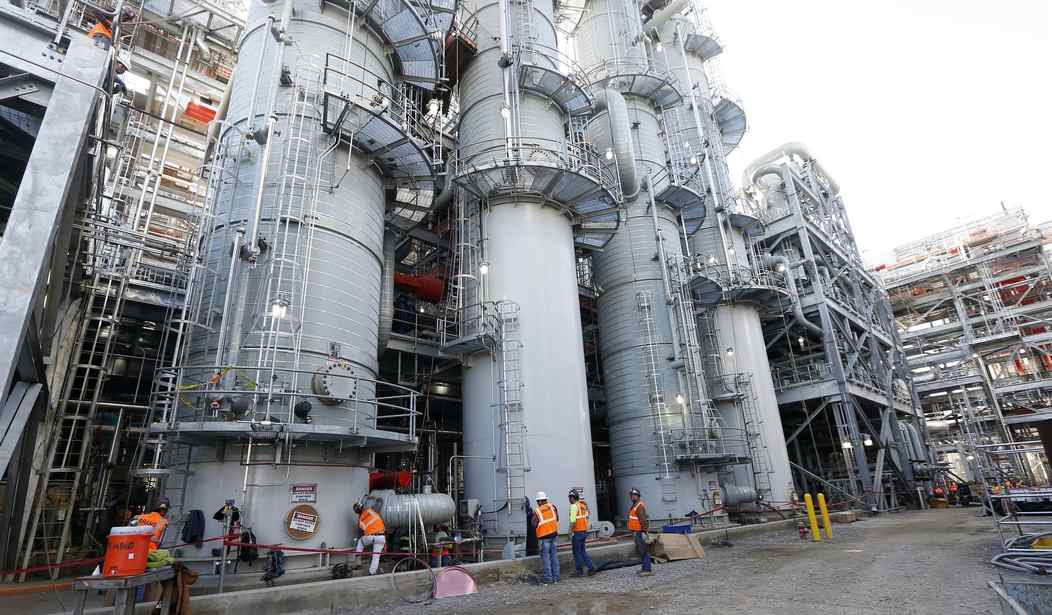For a long time, most of the major oil companies have tried to play nice with climate activists, endorsing green initiatives; environmental, social and governance (ESG) scores; and other climate-alarmist adjacent programs and declarations. I’ve said it before, just look at any major oil company’s website home page, and it’s filled with language about “sustainability” and whatever else.
Big oil and gas companies have tried the appeasement route. When they sacrificed coal, to paraphrase Winston Churchill, they hoped the climate crocodiles would be sated for a while and eat them last. This was a gross miscalculation and betrayal. As part of this gambit, major industry players began to bet the farm – or in this case, our energy security—on the ephemeral promise of government subsidized Carbon Capture Utilization and Storage (CCUS).
Recently, “Climate Czar” John Kerry attended a natural gas conference in Houston, and said very ominously that “if you can’t do that [make CCUS work at scale] we’re going to have a bigger and faster transition than people think.” Even more explicitly, he said that if oil and gas companies can’t accomplish total emissions capture, “they are not going to be part of that winning side.”
John Kerry does not believe that CCUS is viable at scale, and neither do most of the renewables and green pushers. They anticipate it failing, and will likely work to make sure that it does. Even if it did remove 100 percent of every molecule of carbon that would otherwise enter the atmosphere, they would still demand more.
At this point in time, billions of dollars are being spent on CCUS without much to show for it. Even if major reforms on permitting and pipeline construction and technological and property rights hurdles are overcome, it’s unclear if the technology will ever work at broader commercial scale. There is also a question of whether there is enough permanent storage space globally to store all the carbon generated in a single year, much less for all future time.
Recommended
Looking at the downstream effects of CCUS on power plants; most people don’t realize how much energy is lost to operate carbon capture on power plants. Some analysts say that a plant can lose 28 percent of its energy output just to run the system, but at least 15 percent. This may seem like a small price to pay for keeping fossil fuel power going, and you may think you can just hike rates on the rest of us to cover it or get subsidies from our taxes, but that’s not going to remain popular as energy bills continue to climb.
To be clear, oil, gas, and coal companies: environmentalists want you gone—not just operating more efficiently. Organizations like the American Petroleum Institute (API), which favor carbon taxes and huge investments in CCUS may believe that they are providing a business structure that will allow oil and gas companies to continue to exist under the so-called “energy transition,” but they are wrong. The climate scolds’ goal with regard to oil, gas, and coal is bankruptcy, or at least to force them out of the hydrocarbon business.
Taking the “eat me last” approach, natural gas giants have unforgivably lobbied against coal companies, which again, will be shut down no matter how great their scrubber technology and CCUS becomes. That’s especially the case when natural gas companies run around asking for stricter emission regulations (just not on flaring, please!) that would put coal and smaller gas operators out of business. It doesn’t matter if you contribute no carbon emissions, the activists in government are opposed to fossil fuel energy, no matter how efficient and clean it becomes. They simply want people to live with less, and object to anything that is necessary for continued economic growth and consumption. To the gas companies – when you help to finish off coal, you are the next intended target.
It makes absolutely no sense for the Biden administration to hinder liquified natural gas (LNG) export applications, but they did anyway, despite all the progress made on the emissions front from natural gas and despite Europe desperately needing U.S. LNG exports. It only makes sense if you accept that they want you gone.
Shortly after Vice President Harris was anointed by party insiders as the new presidential nominee, her campaign raised about $100,000 from green activists at a single event, where those activists applauded how she “wants to make polluters pay.” If you believe Kamala is genuinely dismissing her surrogates when she claims to now support hydraulic fracturing, I’ve got a bridge to sell you in Brooklyn. She has said very clearly, her “values haven’t changed.”
To those energy companies that are fighting instead of “greenwashing,” that’s excellent, and I am not talking about you. What I am doing is pleading with those that are playing footsie with radical environmentalists and anti-human activists in government to understand that they do not intend to let you continue operations, and every inch you give will turn into a mile they will take.
As a sort of analogy to wrap all this up: picture in your mind a bank heist action movie where the armed gunman asks a bank employee to do something in order to survive, the hostage complies, and then immediately is shot for his cooperation because he’s not needed anymore.
Except in this case, we all really need the oil, gas, and coal industries to survive. But the general public isn’t going to stand up for you when you embrace the same language and enthusiasm for “decarbonization” that your enemies do.
What character do we like in those movies? That bank employee who grovels, or the one who stands and says no, even if he ticks off the bad guys and risks his life doing so?
Linnea Lueken (llueken@heartland.org) is a research fellow with the Arthur B. Robinson Center on Climate and Environmental Policy at The Heartland Institute. Twitter: @LinneaLueken
























Join the conversation as a VIP Member